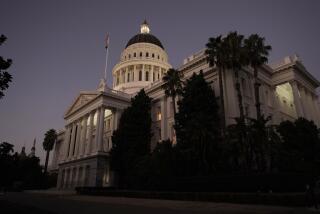Citing Prop. 64, Firms Seek to Kill Lawsuits
Corporations are trying to kill a raft of lawsuits filed under California’s Unfair Competition Law, claiming that the suits were invalidated when voters approved Proposition 64 last month.
The ballot measure made it harder for businesses to be sued over deceptive advertising and other fraudulent practices under the law, which corporate interests have long attacked as an invitation for unscrupulous attorneys to file so-called shakedown lawsuits against businesses.
Since election day, DaimlerChrysler, Mercury General Corp., Kwikset Corp. and other companies have asked state judges to dismiss at least a dozen pending unfair-competition cases. More challenges are expected.
“It’s a great opportunity to wipe out cases that shouldn’t be in the courts,” said John Sullivan, director of the Civil Justice Assn. of California and co-chairman of the Proposition 64 campaign. “These are the kind of cases the voters wanted to get rid of that benefited lawyers primarily.”
Opponents of Proposition 64 -- mainly environmental and consumer rights activists -- accuse business of pulling a bait-and-switch with voters by trying to apply the amended law retroactively.
New laws, whether approved by the Legislature or voters, usually aren’t retroactive unless they contain specific wording that says otherwise. Neither the pro-Proposition 64 TV ads bankrolled by corporations nor the text of the initiative itself said the law would apply to cases pending in the courts.
Business “should be playing by the rules that were in place when the cases were actually filed,” said Bill McGavern, a Sierra Club lobbyist. “They certainly didn’t tell the voters they were planning to cut off remedies that were in place in cases that were already in the system.”
Foes of the ballot measure were clearly under the impression that losing the initiative fight wouldn’t derail important Unfair Competition Law cases already on the docket.
The Environmental Protection Information Center, based in Garberville, Calif., sued Pacific Lumber Co., a unit of Maxxam Inc., on election day to ensure that its case would get a hearing under the old law.
The suit, which alleges that Pacific Lumber violated state logging laws by harming fish and animal habitat, couldn’t be filed under the revised law. Under Proposition 64, plaintiffs in unfair-competition cases must prove that they have personally suffered loss or injury because of a company’s behavior -- and the plaintiffs in the Pacific Lumber case are essentially fish and other wildlife.
Pacific Lumber, which has yet to file an answer to the complaint, said Thursday that it intended to challenge the lawsuit on the ground that it was invalidated by Proposition 64.
The businesses backing Proposition 64 always intended to apply the new law to pending cases and purposely chose not to tell voters, said Fred Hiestand, general counsel for the Civil Justice Assn. of California, a tort-reform lobbying group that helped sponsor Proposition 64. The campaign’s political consultants didn’t want to stray from their message that frivolous lawsuits against small-business owners were bad for the state’s economy, he said.
That was the message Newport Beach attorney Dan Sigler got when he sent an e-mail to the Proposition 64 campaign headquarters in September asking whether the law would be applied retroactively. A few hours later, he received an unsigned response: “No, it will not. But it will keep small businesses from being victims of shakedown lawsuits in the future.”
Sigler, who has defended companies in several unfair-competition cases, said the e-mail exchange suggested that the Proposition 64 backers “were being a little bit devious.” If they had wanted to make the law retroactive, he said, they should have included that in the ballot measure.
Proposition 64 campaign co-chairman Sullivan said his group didn’t mislead anyone. He said there was a legal difference between calling a law retroactive -- meaning it could be used to overturn past court decisions and verdicts -- and saying it applied to pending cases.
He said the campaign purposely avoided such technicalities to keep its message to voters “as simple as possible.”
Trial court judges have ruled on both sides of the issue, and lawyers say none of the cases are likely to be resolved without a definitive ruling from the California Supreme Court. Two cases, involving automaker DaimlerChrysler and insurer Mercury, are before two different Courts of Appeal and could be good candidates for Supreme Court review, attorneys said.
One argument for dismissing pending unfair-competition cases is that the right to sue is granted by the Legislature or the voters and can be taken away at any time by passing another law, said Lisa Jean Perrochet, an Encino attorney. She also contended that Proposition 64 couldn’t be applied to pending cases because it made “procedural” changes regarding who has standing to sue but doesn’t limit the “substantive” right of truly injured parties to recover damages.
Such reasoning is legal hair-splitting, said Robert Fellmeth, director of the Center for Public Interest Law at the University of San Diego and an expert on the Unfair Competition Law. What could be more substantive than taking away someone’s right to sue? he asked.
“I don’t think it’s a close question,” Fellmeth said of Proposition 64. “It’s not retroactive.”
More to Read
Inside the business of entertainment
The Wide Shot brings you news, analysis and insights on everything from streaming wars to production — and what it all means for the future.
You may occasionally receive promotional content from the Los Angeles Times.











